Are you someone who is a bit confused when it comes to the differences and similarities between dehumidifiers and air conditioners? Can AC's work as dehumidifiers?
Well, we have the answers to such questions and more!
Not only that, we will share with you our well-researched Dehumidifier and Air Conditioner Review lists so you can make an informed Dehumidifier or AC purchasing decision.
Let’s begin!
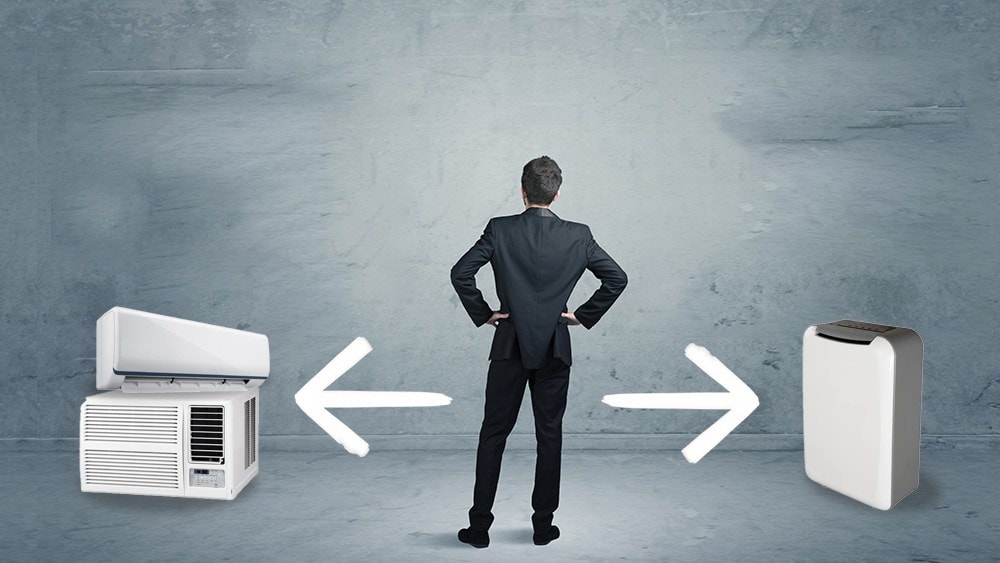
Photo credit: cielowigle.com
What is a Dehumidifier?
As the name states, a dehumidifier is just that, a device which is able to dehumidify the air. Such a unit absorbs moisture from the air and reduces the overall humidity in a surrounding. Some of you might not know this, but humidity can cause a lot of damage. The moisture in the air can damage woodwork, carpets, mats, and more. Humidity also gives rise to an environment that mold spores prefer to grow in.
Furthermore, humid air as particulates which can trigger allergies and asthma attacks. So, by using a reliable dehumidifier, you can reduce the moisture as well as fungus. It will help provide your household with clean air to breathe.
How Does a Dehumidifier Work?
A dehumidifier draws moisture from humid air to dry it. However, it does not cool the air down; instead, the dry air lowers the temperature's real feel.
The dehumidifier pulls warm air into its coils through the fans. This air contracts and cools to a lower temperature as it passes through refrigerated coils in the unit, where it condenses, and the vapor separates from the air.
The condensation droplets collect and drip into a bucket or tray inside the dehumidifier. It then releases the separated cooler and drier air back into the indoor air.
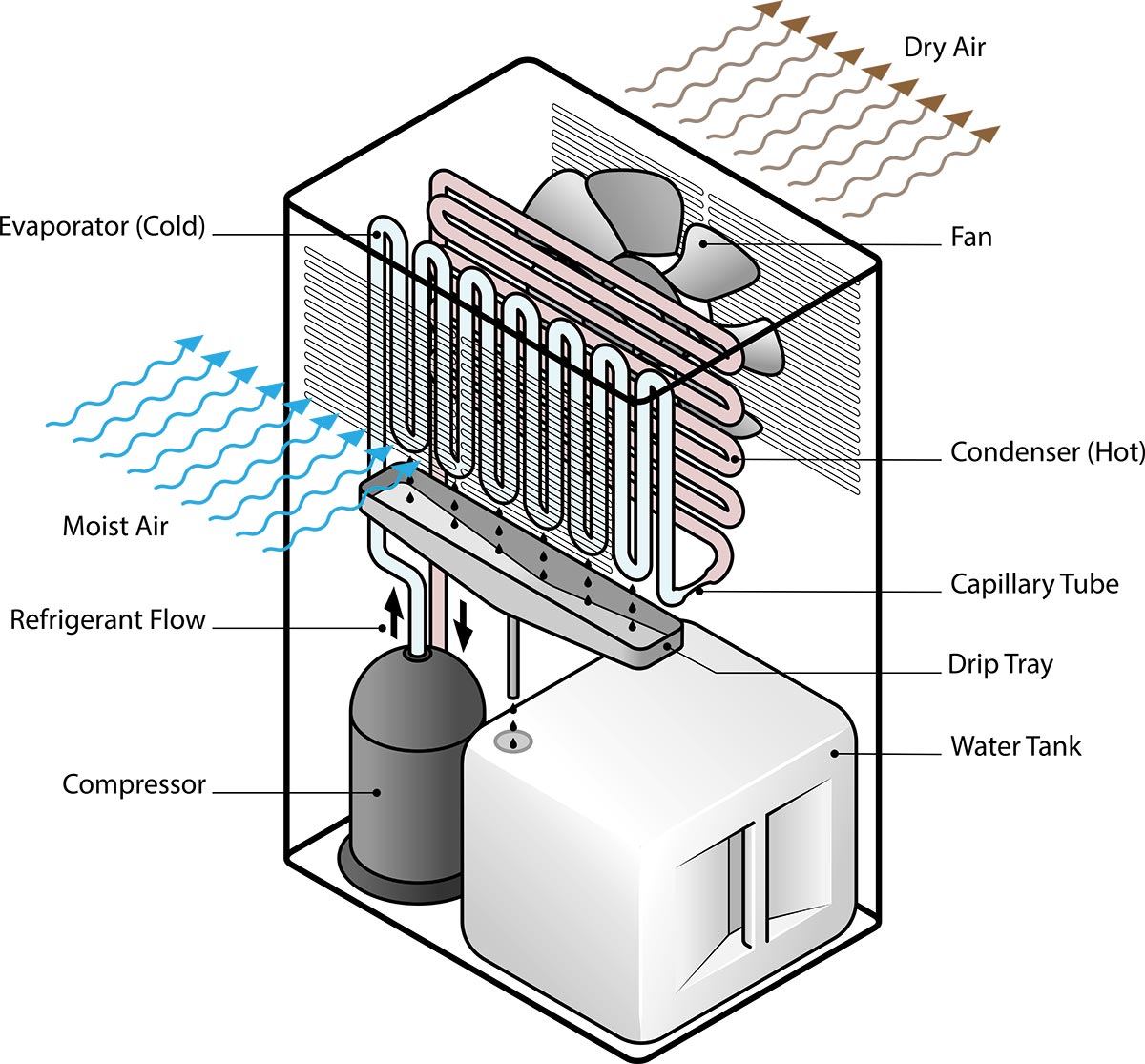
Photo credit: learnmetrics.com
Types of Dehumidifiers
There are four types of dehumidifiers, each with a different method of collecting air moisture.
Refrigerant Dehumidifiers
A refrigerant dehumidifier applies much the same mechanism as your fridge. It works by drawing humid air from the room and cooling it before dehumidifying.
A fan continually drains the indoor air through the appliance and passes it over cool metal plates on which moisture condenses. The condensed vapor drips into the water tank as the unit releases dehumidified air back into the air.
Desiccant Dehumidifiers
Desiccant dehumidifiers absorb vapor from the air and pass it over a desiccant. A desiccant is a "silica gel" type of material that is an excellent absorber of moisture. A wheel with the desiccant rotates slowly through the air stream, drawing moisture in and condensing it.
Whole House Ventilation Dehumidifiers
This type of unit dehumidifies an entire home at once. It pushes dehumidified air into the house through discreet grills mounted in the home, forcing stale and damp air out of the home.
Portable Dehumidifiers
These are the most popular appliances you'll find in most homes. They generally dehumidify medium-size rooms and not the entire house. They are inexpensive, and you can carry them to whichever room you need to dehumidify anytime.
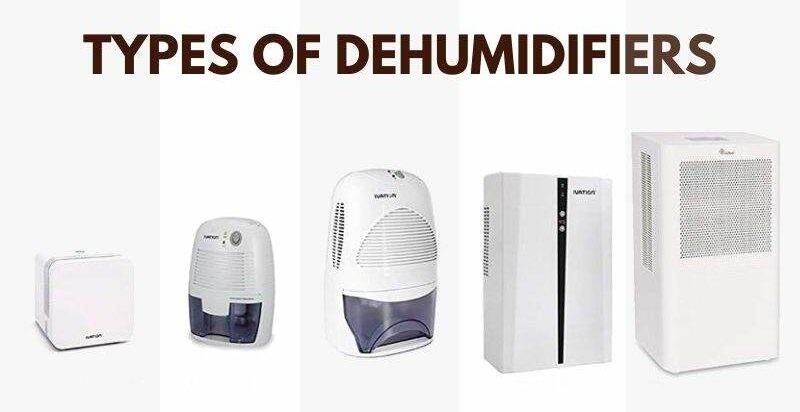
Photo credit: evaporativehumidifiers.com
What is an Air Conditioner (AC)?
An air conditioner or an AC is a device which helps remove hot air while releasing cold bursts of air in a space. An AC is a great way to help keep your home ventilated. It is great to have around during the hot summer months. Having cool air circulating around the house will help keep certain allergies and irritants at bay. An AC provides you with a comfortable indoor environment which has a positive impact on your physical and mental wellbeing.
Some AC units have filters which remove pet hair, dust, and dander from the air to make an area cleaner for you to breathe in.
How Does an Air Conditioner Work?
An air conditioning unit draws moisture, absorbs heat, and cools indoor air.
An evaporator coil absorbs heat from the warm air blowing over it, thus cooling it. A fan then blows the cold air and distributes it.
A cooling agent, known as the refrigerator absorbs the heat in the blowing air. The refrigerant then changes from a liquid state to gaseous and goes to the compressor.
The compressor compresses the incoming gas by squeezing it tight, making the refrigerant a high pressure and super-hot vapor.
The water vapor reaches the condenser outside your home and is released outside.
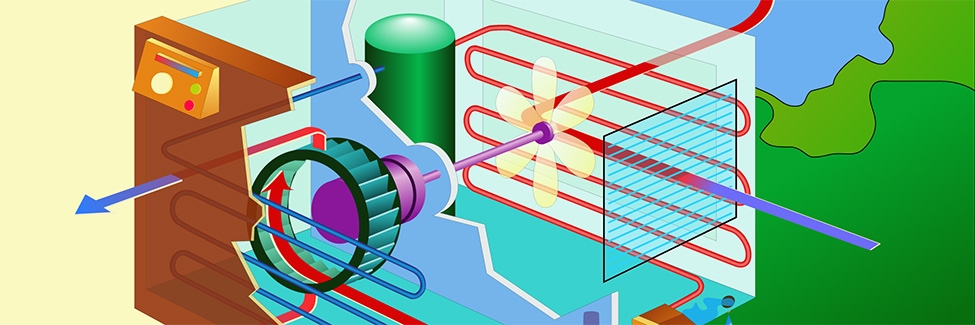
Photo credit: hvac.ninja
Types of Air Conditioners
All air conditioners operate similarly, however, there are several types to choose from:
Central Air Conditioner
A central air conditioning system is suitable for a large home with many rooms. It combines the evaporator, compressor, and condenser and can be placed on the roof.
Ductless Mini-Split
A ductless mini-split AC unit is a good option for homes without ductwork. They comprise a two-part system; an outdoor compressor unit and indoor air handling units like the evaporative.
Window Air Conditioner
These are the most common AC Units, popular for single rooms. They are usually fitted on window sills with an exhaust system that releases hot air out at the back.
Portable Air Conditioner
A portable AC is similar to a window AC in capability, but they usually have caster wheels for easy movement between rooms. It has a power outlet and a window to channel exhaust air outside.
Hybrid/Dual Fuel Air Conditioner
These AC types are energy-efficient and money-saving because they alternate between using electricity and burning fossil fuel when conditioning the home.
Smart Air Conditioner
Smart air conditioners are IoT-enabled. You can connect a smart ac unit to wi-fi and operate it on an app on a smartphone from wherever you are.
Geothermal Air Conditioner
This air conditioner draws heat from the ground and transfers it to the home during winter. It then extracts the excess indoor heat to the ground in the summer.
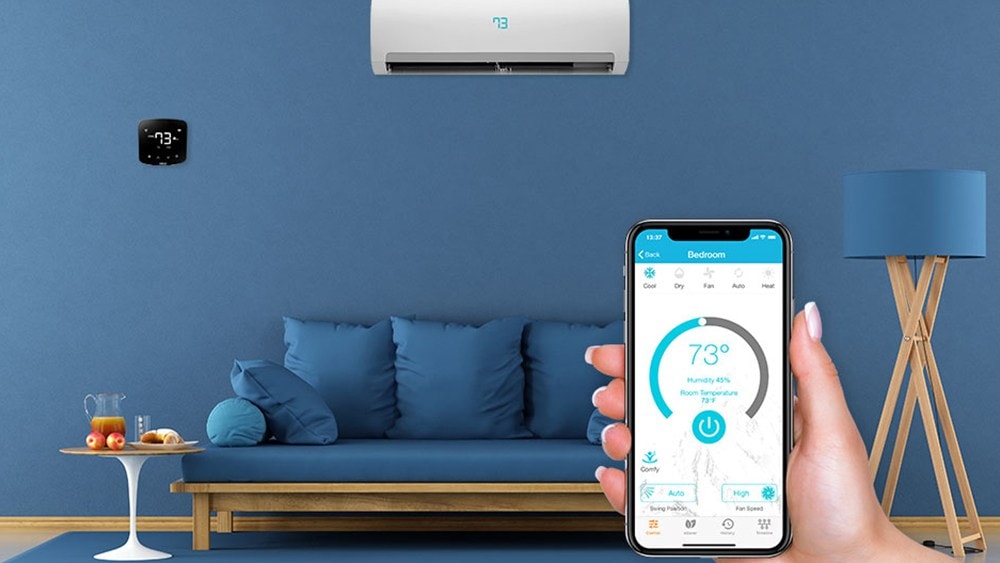
Photo credit: cielowigle.com
Dehumidifiers vs Air Conditioners - Similarities and Differences
Wondering about the similarities and differences between Dehumidifiers and Air Conditioners is valid. We are going to offer out help with all of this. Below we have broken down the differences as well as the similarities between such electronic equipment. We hope the information we have shared offers you the answers you are looking for.
Differences
Let’s begin with the differences between a Dehumidifier and an AC.
Mode of Operation
The way Dehumidifiers and AC's work is different. In a dehumidifier, the air travels across a series of cooling coils (they can also be evaporators), and then immediately over a set of heating coils (or the condenser). After such a journey, the air is then released into the outside area as drier air (with reduced moisture).
As for an air conditioner, the air travels over just the cooling coils and then released into the room. Furthermore, the heated Freon passes through a tube (which is outside the house) and into the heating coils. The outside air passes over it before release.
Dealing with Moisture
Dehumidifiers and AC’s handle moisture a bit differently. Of course, both condense moisture on the cooling coils present in them. However, an AC pools the condensate in a space (pan, tank, etc.) which drains outside, normally through a drainage tube.
Dehumidifiers, on the other hand, after pulling the water or moisture from the air, store it in a water reservoir. A hose attachment is ordinarily present for drainage. Such units also tend to have auto-off features to prevent spillage.
Changing Temperature
Temperature control is another difference between an air conditioner and a dehumidifier. AC’s are used for controlling the overall temperature of a space. AC’s have been created to expel hot air out of a space while throwing cool air in a space.
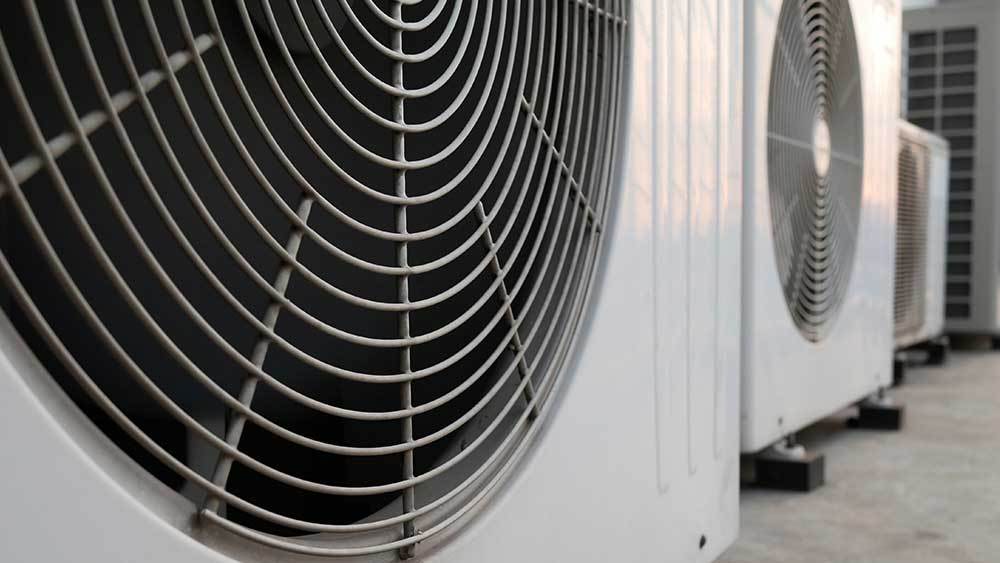
Photo credit: cielowigle.com
Dehumidifiers aren't used for temperature control. They are more concerned with the humidity levels of a certain space and will help extract moisture from an area.
Similarities
Of course, there are certain similarities between a dehumidifier and an air conditioner. We are going to cover some of these similarities to help you understand more about these devices.
Cleaner Air
Both, the dehumidifier and an air conditioner can be used to ensure the flow of cleaner air indoors. These devices have filters in them which are able to trap certain particulates in the air. The filters can trap pet dander, hair, and dust. This allows for the space to have cleaner air for everyone to breathe.
Ventilation
Another similarity between an AC and a dehumidifier has to do with ventilation. Both devices are able to offer comfortable ventilation in an indoor space. You can easily operate them in bedrooms, living rooms or even the basement for ventilation purposes.
Health Issues
AC's and Dehumidifiers are also similar when it comes to ensuring prevention from specific health-related issues. Due to both devices offering you a certain amount of control over humidity and temperature, the cleaner air they produce can help keep specific allergic reactions at bay. Both devices, due to the use of filters, can also get rid of certain air particulates which may cause skin irritation.
Portability
Depending on the model you go for, dehumidifiers and air conditioners also offer a certain extent of portability (with wheels, smaller size, etc.). This level of portability makes it easier for you to move these units from room to room depending on what is required in terms of humidity or temperature control.
Water Storage
Both units extract moisture from the air. This means both devices need to store as well as expel water. That is why these electronics have a drainage system.

Photo credit: milleroilcompany.com
Top Pick Between Dehumidifiers and Air Conditioners
Now that we are almost nearing the end of this article, we can't let you go without sharing our thoughts regarding the top pick between dehumidifiers and air conditioners.
As mentioned in our review lists, all of the selections have something to offer. Certain models are the best for the money, giving you excellent features against a reasonable price tag. Other models are our top picks, and that is what we are going to talk about.
If we were to choose, we would go for the Danby Energy Star 70-Pint Dehumidifier and the Honeywell Portable Air Conditioner. We say this because these units are some of the most reliable offerings currently in the market. The Danby Energy Star dehumidifier is perfect for quickly reducing humidity from a space.
The Honeywell Portable Air Conditioner allows you to set it up in any room without hassle. Of course, both devices play a crucial role in providing your household with cleaner air. Pairing an air conditioner with a dehumidifier will increase overall effectiveness.
Conclusion
We hope we were able to offer you valuable information about dehumidifiers and air conditioners. As you can tell, both devices have similarities as well as differences. The good news is you can use these units to control the humidity and temperature of your house for comfortable living.
So, if you are interested in purchasing a dehumidifier or an air conditioner, make sure to go through our review lists for an informed buying decision that will make your life more comfortable in the long run.
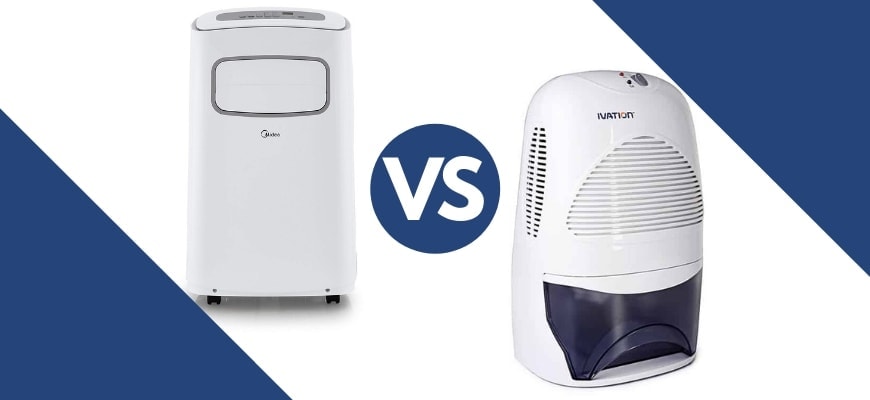
Photo credit: goodairgeeks.com
People Also Ask
Buying an air-cooling system is a significant investment for you and your family. For this reason, most homeowners never want to go in uninformed. After all, you need them to keep your family comfortable. Here are answers to some of the questions most people ask about these appliances.
Who Invented the Air Conditioner?
In 1902, Willis Haviland Carrier invented the first modern air conditioner. While experimenting on humidity laws, this skillful engineer invented the system to solve an application problem at a printing firm in Brooklyn, NY.
The air conditioning concept was quoted among the 20th century's ten most outstanding engineering achievements.
Does a Dehumidifier Cool the Air?
Dehumidifier systems work by removing excess moisture from the indoor air but not cooling the air. It draws the existing muggy and heavy vapor from the air leaving it dry and comfortable. Doing so reduces humidity in the air, which is the leading cause of heavy breathing in a room.
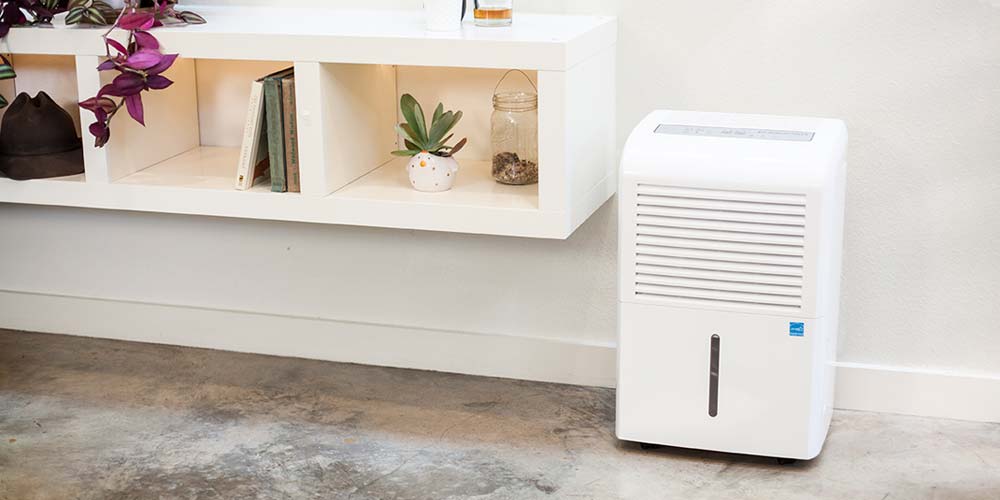
Photo credit: compactappliance.com
Who Invented the Dehumidifier?
An American engineer, Willis Haviland Carrier, invented a dehumidifier while working for a publishing company in 1902.
In response to an air quality problem in his firm, he ran warm air through a pipe with cold water. He realized that circulating air over cold pipes produced cooler air and removed water from it.
Can You Get an Air Conditioner Dehumidifier Combo?
An air conditioner-dehumidifier combo can be the best approach to accomplish both tasks of cooling the air temperatures and maintaining dry air in one unit. There are many air conditioner dehumidifying combos on the market. Since they are costly, you can accomplish much more if you buy individual units for each task if you are on a tight budget.
Do Dehumidifiers Produce Heat?
If you've noticed your unit producing heat, you could be wondering if it is a cause for concern. It shouldn't be because dehumidifiers naturally produce heat as they operate.
When dehumidifying, the compressor generates heat. It then exhausts small amounts of warmer air to avoid overheating. However, the heat shouldn't be in excess, unless your dehumidifier has a malfunction. Note that this heat is not meant for heating the room since the work of the dehumidifier is to drain the air of moisture to dry it.
